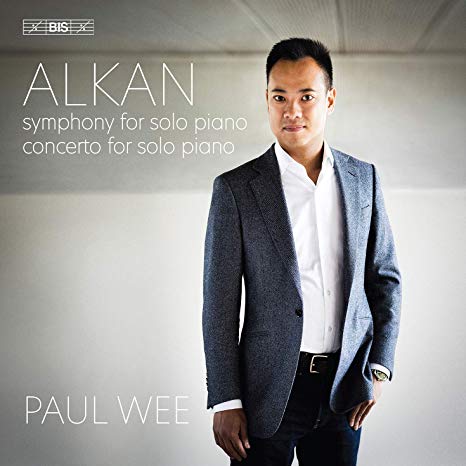The City lawyer who plays the unplayable
mainIn today’s issue of the Spectator, I discover an amateur pinaist who plays the most difficult works of the unfathomable Charles-Valentin Alkan – and does so with incredible passion and panache.
… Trust me, there is nothing light about this score. In any halfway decent attempt at a performance, the Allegro opening movement sets a pace way over the speed limit and a noise level that is harmful to health. It is followed by a Marche funèbre that calls to mind Mahler’s in his first symphony, with similar splashes of the macabre. And when Alkan writes presto on the finale, he does not mean subsonic. Wee is not the fastest pair of hands I’ve heard – Hamelin’s personal best will take some beating – but he achieves a filigree accuracy and, velocity aside, a tear-streak of real feeling….
Read on here.







Dear Norman, as for english pianists, would it not be Jack Gibbons or Mark Viner instead of Stephen Hough, although the latter’s La Chanson de la folle au bord de la mer op. 31 n°8 is wonderfully apocalyptic ?
I’ve seen him play and was green with envy
Mr Hough’s exercises in territories where he is not at home, are merely embarrassing.
As are so many of your comments, Mr Borestlap. (mis-spelling intentional). I understand you are a composer, but have never had the ‘pleasure’ of hearing anything you’ve written in 30+ years of international concert-going and reviewing (except the “Dirge in A minor” and Fanfare “How wonderful I am” you continually re-write here for others to endure). As for Mr Hough’s pianism – it has never displeased me, so do better yourself in public and to repeated critical acclaim. Then, and only then, I will review my opinion of you.
I repudiate your petulant expostulations……
Mr Hough is an excellent pianist, but his own attempts at composing? Decide for yourself:
https://www.youtube.com/watch?v=2FmvkYURUKc
Instead of ad hominum attacks, it is always better to look at the arguments and the evidence. Also your interpretation of texts seems a lot to be wished for.
To be fair your original comment referring to Hough’s “exercises” didn’t make it fully clear you were referring to his compositions, and hence the comment responding to you is justified and understandable. Previous posts were about pianism and the art of playing rather than composition, so your take down of Hough was out of context in that specificity. Also, it must be pointed out that several people have given pageturner’s comment the thumbs up. If ever there was a comment written in response by someone with a thin skin, this is it. You should perhaps stop taking Trump’s twitter feed as your model for social interactions. P.S. I too have never heard your compositions, but Wikipedia – self-authoured? – states they are fairly widely performed. One question – I am just wondering why you’d need a pianist to ‘discover’ your piano pieces, as is claimed? Surely you have performed and / or promoted them? Unless of course they are so obscure that no one else could be persuaded to take them before the public…
Just to be clear: the original comment stated:
“Mr Hough’s exercises in territories where he is not at home.”
Therefore, a careful reading would have revealed that the author considers Mr H’s exercises in writing music of a different category than his pianism. It is difficult to see why one were not allowed to have an opinion about an artist who wilfully shares his prowes in public. Changing the subject for lack of argument is then the usual tactic of the frail and ignorant….. If people still have great difficulty with difference of opinion, the last thing they should do is visiting the website of Slipped Disc.
And to be a bit pedantic, all contemporary accounts reveal that Chopin played the piano not loudly, but softly to the point of near inaudibility , particularly in his last years.
An interesting review all the same
Chopin’s pianissimi’s in his later years were due to his failing health. He liked Liszt’s performing of his music, especially the etudes, because of L’s physical strength.
Haven’t heard this (and am not really a fan of Alkan), but I’ve noticed something about speed:
Some musicians can play things super-duper fast. That’s great, but the human brain can process sound only up to a certain speed. (Certainly that can be speeded up with training, but most audience members are not professionally trained musicians.) Any faster than that, and it just sounds like a wash of notes.
A tiny bit slower, and each note is able to hit the ear as a separate entity, providing a lot more neural stimulation and a greater impression of — not of speed necessarily, but of “wow, that’s really good.”
I heard a recording of the Schumann Toccata once (Kissin maybe?) that was so fast I couldn’t tell what was going on. It was good, I guess — it didn’t sound like there were any wrong notes — but I got no impression of the piece from it.
Argerich, IMHO, somehow manages to avoid this most of the time.
« As fast as you can hear » – used to say my piano teacher.
An amateur pianist Ken Iisaka from California plays all difficult C-V. Alkan pieces for decades.
There Alkan piano competition in Athens, Greece. Young pianist play mandatory Alkan pieces on program. I heard Mark Viner at 1st competition.
I’m interested in checking out this recording, As usual with Alkan, the conversation is focusing on his “unfathomable” (NL’s word) gigantic virtuoso works.
I’d like to take the opportunity to mention that Alkan’s oeuvre also contains simpler, shorter pieces, some of them (IMO) of considerable charm. If the big Etudes (which include the Symphony and Concerto) are not to your taste (or your level of technique), I encourage you to sample the Preludes op. 31 and the Esquisses op. 63. There are also some gems among the Chants (op. 38, 65, 67, 70). I think some of these pieces would be excellent for piano students as well.
The shorter pieces show Alkan to better advantage than the more garrulous/barnstorming compositions. There’s a dimension missing.
Very interesting article. Alkan is a very interesting composer indeed. Here is the piano symphony, played by Gibbons:
https://www.youtube.com/watch?v=79ZNMQ4neJM
Chopin needed less notes to say more in shorter time spans. Yet, this ‘symphony’ is very impressive, a tour de force, not only for the performer.
A successful lawyer and a ‘keen pianist’ – it’s very enjoyable to witness this phenomenal brain in action. https://www.3vb.com/our-people/download-cv/paul-choon-kiat-wee https://youtu.be/VqeB6lfvM1Q
Interesting. Mr Wee is an impressive player, an olympian one in fact, in spite of the wrong notes in this video – there are so many notes, one forgives him, it’s a great achievement to play like this and by heart. I only listened to the first 12 minutes. This is a strange piece: there is a flavour of mediocrity and musical emptiness in spite of the virtuosity, and the best bits are the ones which are Chopin imitations. My guess is that the reason that Alkan’s music did not get the reputation comparable with his rivals, is that its complexities and virtuosity cover-up some lakc of invention and expression – it is all very impressive and very interesting, but in the end it leaves you rather cold. It remains all on the outside.
I find myself in agreement with you here.
For my money, the best Alkan pianist out there today is Vincenzo Maltempo, though he’s concentrating on other things these days. His playing not only has great speed, but his technical abilities are far superior to Raynond Lewenthal and Ronald Smith. I leave this link, https://www.youtube.com/watch?v=NsGrV1HF_tk
Thank you for sharing this…. it’s spectacular! Interesting to see how economic the technique of this pianist is – no movement is wasted and where the hands lift from the keyboard, it is a spontaneous reaction after touching. Most of the time, the hands are kept very close to the keys.
What I really want to hear is that Alkan cadenza for the Beethoven third! Did he also write cadenzas for the other four?
SoCalPeter, you probably know that Alkan’s spectacularcadenza for the first movement of Beethoven’s third concerto is recorded by Marc-Andre Hamelin. It’s nearly as good and admittedly more flamboyant than Edwin Fischer’s, and better than Akan’s other barn-burner Duo Bombardo for four feet intended to be played on a pedalier. the recording I know is on two pianos.
I don’t know of any other Alkan cadenzas. But Carl Reinecke’s cadenza for Beethoven’s third isn’t to be missed. Backhaus and Moiseiwitsch play it on their recordings. Or Edwin Fischer’s. Maria Grinberg plays a Reinecke cadenza on her record of the fourth concerto, but it’s not as impressive.
He’s no Dr. Thomas Yu…
Paul Wee plays with so little emotion and expression. I know much more talented amateur pianist in UK as good as my lovely friend Thomas Yu.
Though this is in some ways the aesthetic of the music. I always feel I’m being kept at arms length with Alkan save for some of the miniatures. A fascinating figure though.
Marc-Andre Hamelin plays Alkan’s cadenza for the primo of Beethoven’s third concerto on his Hyperion CD “Live At the Wigmore Hall’.